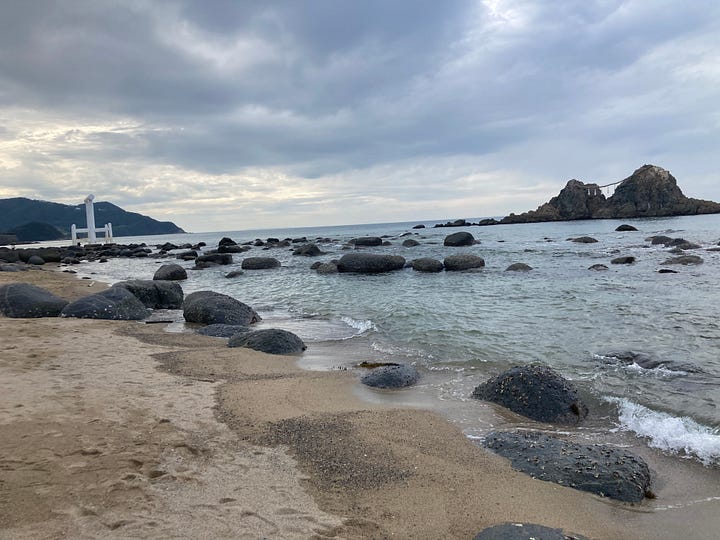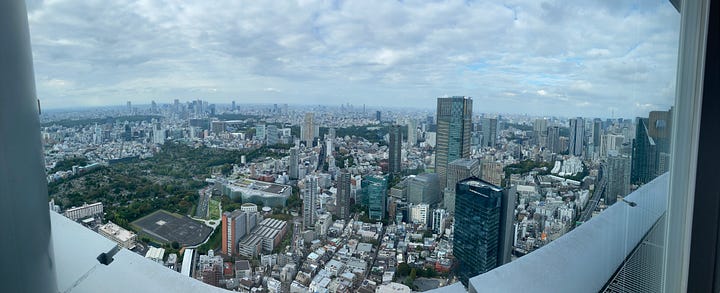It has been a while since my last post. Illness and work have hindered my creative flow—but I want to tell you about my big trip to the East. Last winter, when I visited my father in the final month before his death, I also saw my brother, who lives nearby. He invited me to join him on a pilgrimage to his new-found love: Japan. It would be his fourth trip in so many years, and he’s got another planned for December. What’s the big deal with this country? It seems everyone I know is either fresh back or planning to go. Off I flew to meet him in Tokyo at the beginning of October for over two weeks of adventures.
Yes, it was exciting, even overwhelming—innumerable impressions, all so different from the West. We began in Tokyo, went southwest to Kyoto, then a brief overnight in Hiroshima, on to Fukuoka with a day trip to Saga, and back to Tokyo. In Tokyo, we visited an old friend from my university days, after 24 years! Seeing someone on social media for decades doesn’t mean you know much about their life.
Hearing about Japan from other people, watching movies, or even watching a 24-episode Great Books course on Japan’s cultural history, as I did (little flex there), is not the same as being there yourself. I also watched The Last Samurai on the flight to Tokyo, which was surprisingly helpful later when exploring the various museums and their sword collections.
So much of what you read about Japan or see in films is true, but experiencing it is different. Maybe that’s why I keep going on trips despite my propensity for illness and exhaustion. Besides having a bucket list that resembles an atlas, what I want to know is: what am I like in a new environment? That can be more interesting than what’s different in the environment compared to my home. Between my brother and all the media I’d consumed, I knew about many differences, but to know yourself in another context is the true revelation. Yet, there were surprises.
To summarize, the Nippon vibe is the transportation of ordered masses. Hi-brow, low-brow. Hi-tech and slow, old school. Delicious food. Apple-pumpkin-pie-cheesecake in one. Crowds and quiet Zen gardens (for a price). Technology and innovation, yet the insistence upon conserving tradition. Towers and tunnels. Contrasts abound. There are big bears in some of the forests, no smoking in public, only in walled-off little ostracization corners, and they do salty savory for breakfast. They eat dried fish with almonds like trail mix. But not just anywhere: there is no eating or drinking on public (transport). Thus, everything is so clean!
I’ve been told by more than one person, from therapists to my sister, that I am a Highly Sensitive Personality Type, and it is true. I am also a high-sensory input-seeking person, meaning I want to be stimulated, and then I’m overwhelmed. Not fair, but thems the breaks. Upon arrival in Tokyo, on the train from Narita, one of the two airports into the city, the train monitor in the car had a delay listed, and under cause, it said, “Unidentified Noise.” That’s how I felt for two weeks.
It’s noisy in Japan. In Tokyo, and other big cities, the baseline is a beeping, coming from somewhere. No wonder the Zen Garden is a thing (I know, I know, the gardens came first, then the cities but even back when people needed a break from other people). I made an audio recording in a subway station in Tokyo to give you an idea of the noise level. Not understanding Japanese, it’s a jumble of beeping for train arrival and departure, and overhead announcements. Have a listen:
So much has been said about the famous bidet-style Japanese toilets that I won’t repeat it all here, but yes, it is true that they are amazing. Even Slavoj Zikek has theories about cultural philosophy based on observing how countries deal with their excrement. Clearly, the Japanese value privacy highly. As soon as you enter the room or sit down, music, waterfalls, and birds chirping start playing to mask reality. But the endless beeping and springing to life of the machine was contraindicated for the relaxation needed for the task at hand. Overall, the omnipresence of technology was fascinating and yet overkill. The trick is to bring black sticky tape to cover all the LEDs in the hotel rooms. But the fire alarm with the beeping light right above the bed remained unsolved.
The most important part of the hygiene system is that it is free of charge and clean. In Japan, they have accomplished this in spades. Only by being surrounded by free bathrooms did I notice how much anxiety I have around finding one when nature calls. Only once, when we’d wandered far off to see a distant temple, did we have to really look and walk an extra ten minutes to find a bathroom.
Gosh, half of my crazy travel stories revolve around this toilet topic (that time they had to break down the door to get me out of a toilet in a café in Buenos Aires—I had mistakenly entered the employee one, which they knew not to close because the door was broken), to the endless Tajikistan tales of woe. At the basic baby level of being human, life revolves around consuming, excreting, sleeping, and hygiene. These areas are well-covered in Japan.
At some point, I caught a glimpse of my dad in my reflection in the train window. People often tell me I look and sound like him—but that was inconceivable to me. When I look in the mirror, I see myself, the earthly shell at least, and when I think of myself, it is often in contradistinction to my dad. I am not like him in this or that respect, or I am trying not to be. But now, in my forties, the genetic line is strong.
My brother had already been to Hiroshima, but I wanted to see that famous city, so we made a short stop. We arrived on Saturday around noon and departed the next day onwards to Fukuoka. Walking around the center, we took some photos at the Peace Memorial after braving crowds inside that certainly broke every fire regulation, causing a near panic attack on my part. It’s still worth it, just don’t go on a Saturday afternoon. We continued sightseeing and taking photos, and stopped in front of Point Zero, where the center of the blast was and where they left a destroyed building standing to remind us of that day. It didn’t seem right to be grinning like an idiot in selfies in that situation, so I put my “serious face” on, where I pressed my lips together, making a resigned not-smiling expression. As soon as we looked at the photos, we both agreed that I looked like our father! I call it my “Papa face,” and I made it more than once on the trip. I had a dream one night, too, that I was in a car with my family on a trip and looked back to see my dad chilling in the back seat! I was surprised to see him there, and he said, yes, of course I’m here! He’s keeping tabs on his kids still and sure seemed happy.
Japanese are also known for not grinning, crying, or laughing raucously in public. I am a very expressive person, even for Western standards, so this was an adjustment. How to know when someone is angry, happy, sad? Especially not speaking Japanese, how could I know? I noticed that similar to how I kept trying to make sense of everything I saw without being able to read any signs in Japanese, I would rely on my life experience and the context to make educated guesses. No matter the culture, the expression of humanity may vary but will still be the same. So I people-watched intensely, assessing expressions and looking for familiar emotions.
Everything seems turned around, opposite in Japan. They do drive on the other side, like the Brits, etc. but also walking down the stairs, people stay on the left, going up is on the right, and there are arrows on the floor, guiding streams of people so that they don’t bump into each other. In the museum, there is a sign pointing everyone to cycle clockwise around the exhibits. Whereas the westerners just randomly look at this or that… which is my tendency. I want to follow my whims.
However, the regimented nature of society, which is very constraining, also has a comforting and simultaneously terrifying effect. The tradeoff for cleanliness is that our individual freedom (to snack in the subway) must be tempered for the collective good. We could use even a tiny bit of that in Berlin these days, where the heaps of trash blight the city. Not only do people not play along, but even when you try, the bins are full, and the glass recycling containers overflowing. Berlin’s been known for being brutal, harsh, and rough around the edges. But now it’s getting serious, and public infrastructure is indeed falling apart. During the trip, I kept asking myself: how can some of these positives be transferred to Berlin? But the cultures are so different I don’t know where to start. People still spit on the ground in my Berlin neighborhood. I thought we did away with that in the late 1800s when we learned that it spread disease. Meanwhile, Japan has music playing in the free, clean public toilets.
After so many impressions, mostly of a positive nature, and endless hours on trains, planes, buses, and automobiles, I was happy to land back in Berlin. I immediately caught a cold that led to another, and the rest is nothing we haven’t already heard. Oh, there was an election in there too, that sucker-punched my immune system. More on that next.


Welcome in Berlin
Welcome in Berlin is how Germans say in English welcome to… whatever city; you hear it enough, and it starts to sound grammatical.
Tajik Sweet Sixteen #15
I remember being sixteen on the feelings level. The pimples, the insecurity, the unknownness of life. It’s not as if it were yesterday, but hanging out with teenagers, it all comes back. Here’s a story about a girl’s life in Dushanbe.






Loving this so far, especially this line: I am also a high-sensory input-seeking person, meaning I want to be stimulated, and then I’m overwhelmed. Not fair, but thems the breaks.
Can relate!